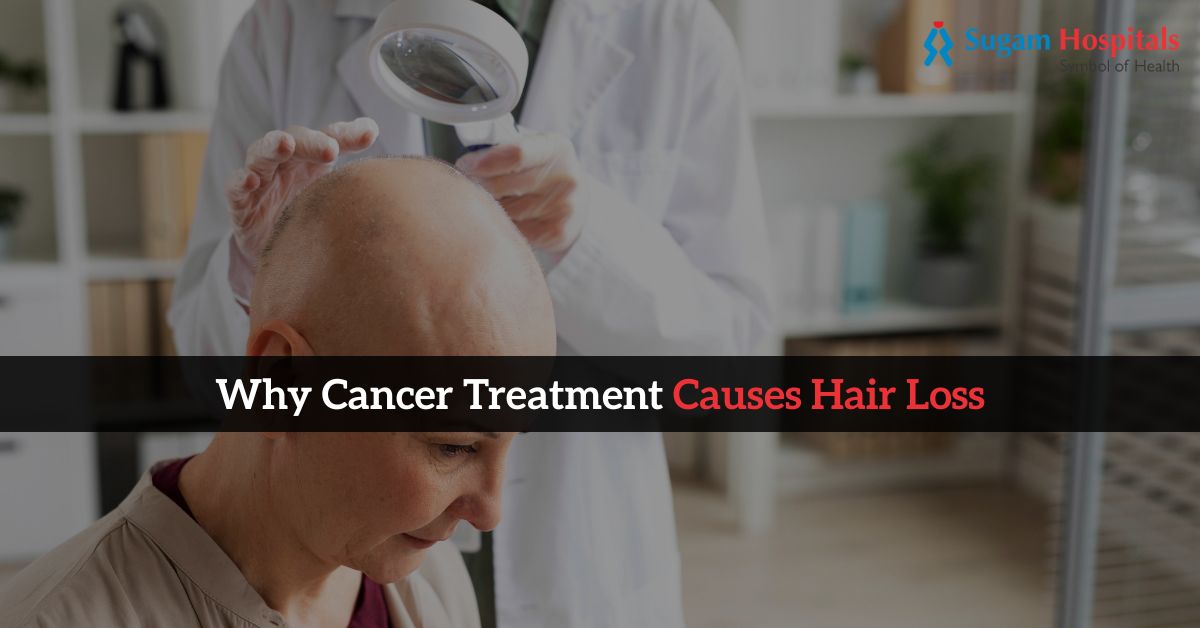Why Cancer Treatment Causes Hair Loss

Why Cancer Treatment Causes Hair Loss
October 1, 2025 by adminAt Sugam Hospital, we understand that cancer treatment is not only about fighting the disease but also about coping with side effects. One of the most visible and emotionally difficult changes is hair loss. Many patients and their families often ask us why this happens, whether it is permanent, and how to handle it better.
Below, we provide clear insights into why cancer treatment causes hair loss, what to expect, and how we support patients through the process.
Understanding Hair Loss During Cancer Treatment
- Hair loss in cancer patients is known as alopecia.
- It occurs mainly due to chemotherapy and radiation therapy.
- The scalp is most affected, but eyebrows, eyelashes, and other body hair can also fall out.
- Not all treatments cause hair loss; it depends on the type and strength of therapy.
Why Chemotherapy Leads to Hair Loss
- Chemotherapy targets rapidly dividing cells, aiming to destroy cancer cells.
- Hair follicles also divide quickly, making them sensitive to these drugs.
- As a result, chemotherapy unintentionally damages hair roots.
- This leads to thinning or complete loss of hair depending on dosage and duration.
How Radiation Therapy Triggers Hair Loss
- Radiation therapy focuses on specific areas to kill cancer cells.
- When directed at the head, it damages hair follicles in the treated region.
- Unlike chemotherapy, hair loss here is localized to the targeted area.
- Regrowth may be thinner or in a different texture after completion.
When Does Hair Loss Begin?
- Hair typically starts falling two to four weeks after the beginning of chemotherapy.
- Some patients see gradual thinning, while others experience sudden shedding.
- With radiation, hair loss starts within a few weeks but only in the treated region.
Is Hair Loss Always Permanent?
- With chemotherapy, hair loss is usually temporary. Regrowth starts within 1–3 months after treatment.
- Texture and color may change when hair grows back.
- With high-dose radiation, hair loss can sometimes be permanent in the exposed area.
Emotional Impact of Hair Loss
- Hair is strongly tied to identity, confidence, and self-image.
- Loss of hair often causes emotional stress and anxiety for patients.
- It serves as a visible reminder of illness, which can affect self-esteem.
- At Sugam Hospital, we provide counseling and emotional support to help patients cope.
Coping and Managing Hair Loss
-
Prepare Mentally
- Cut hair short before treatment to reduce the shock of sudden loss.
- Explore wigs, scarves, or caps to feel more comfortable.
-
Scalp Cooling Therapy
- Cooling caps during chemotherapy can reduce blood flow to hair follicles, lowering the chance of hair loss.
- This option should be discussed with the oncology team.
-
Gentle Hair Care
- Use mild shampoos and soft brushes.
- Avoid chemical treatments, dyes, or excessive heat styling.
-
Protect Your Scalp
- Wear hats or scarves outdoors to prevent sunburn.
- Apply sunscreen if the scalp is exposed.
-
Balanced Nutrition
- A protein-rich diet with essential vitamins supports healthy regrowth post-treatment.
-
Emotional Well-being
- Join support groups or counseling sessions.
- Remember that hair loss does not affect treatment success.
How Sugam Hospital Provides Support
- We prepare patients in advance for changes like hair loss.
- Counseling sessions are offered for both patients and families.
- Guidance on wigs, scarves, and head coverings is provided.
- Support groups are available where patients can share experiences.
- Post-treatment monitoring ensures recovery and hair regrowth support.
Myths vs Facts About Hair Loss in Cancer
- Myth: Every cancer patient loses hair.
- Fact: Only certain treatments cause hair loss.
- Myth: Hair will never grow back.
- Fact: In most cases, hair regrows after therapy.
- Myth: Special oils can stop hair loss.
- Fact: No oil or shampoo can prevent chemotherapy or radiation-related hair loss.
- Myth: Cutting hair prevents falling.
- Fact: Cutting only reduces emotional impact, not the process itself.
The Hope Beyond Hair Loss
- Hair loss may feel overwhelming, but it is often temporary.
- For many patients, regrowth marks a symbol of survival and strength.
- Hair may return in a new form, but the journey of recovery is more valuable.
- At Sugam Hospital, we remind patients that courage and healing matter more than temporary changes.
Conclusion
Hair loss during cancer treatment is a challenging side effect, but it does not affect the effectiveness of therapy. With proper guidance, emotional support, and self-care, patients can cope with it better and look forward to recovery. At Sugam Hospital, we stand by our patients not only in medical treatment but also in their emotional journey, ensuring they feel supported every step of the way. Our commitment to holistic care has made us a trusted Cancer Hospital In Chennai for comprehensive cancer treatment and recovery.

